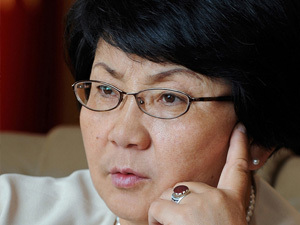Russia, Manas and the CSTO: Q&A With Roza Otunbayeva
December 17, 2012, 06:00
The U.S.’s Manas air base in Kyrgyzstan could be a target for “enemies,” there’s no way to be sure that corruption has been rooted out from the lucrative fuel contracts for the base, and Russia is Kyrgyzstan’s strongest military partner. That’s according to Roza Otunbayeva, the former president of Kyrgyzstan who made her first visit as ex-president to Washington this week. She was in town to receive an award from the Eurasia Foundation, and also took a bit of time to sit down with The Bug Pit to discuss some of the big issues in Kyrgyzstan and the region. Below is our interview, edited for clarity.
The Bug Pit: It’s been argued that the focus on Afghanistan has distorted the U.S.’s policy toward Central Asia and made it “oversecuritized.” Do you agree?
Otunbayeva: No, it’s not fair…. The United States responds to all our needs immediately. When we had the tragedy in 2010, we had two [military] bases, Russian and American. None of them were involved in our internal affairs, but the U.S. responded to our tragedy immediately, with theOTI program. Of course, I can’t deny that that Manas is a tool for the U.S. But I don’t think Kazakhstan or Tajikistan either will tell you that now only Afghanistan is the highlight of our relations, no.
BP: Manas has strengthened your relations with the U.S. and brought the government a lot of revenue, but it’s also led to a lot of corruption, including at very high levels. Overall, is Manas a good thing for Kyrgyzstan?
RO: As a journalist, you can formulate, good deal or not a good deal. But it was something inevitable for you to have the base, the solution to locate the base in Kyrgyzstan. That was the solution taken by [former president Askar] Akayev, in consultation with Russia, with [Russian President Vladimir] Putin… Now, certainly it brings good and bad together. I told your government, even Mr Obama, that this is wrong, such a non-transparent supply, that these people dealing are not always fair.
The U.S. government is a big machine, and the Pentagon is the kingdom within a kingdom. Somehow it’s happened that this Red Star and others, all the deals have been canceled. I don’t know if it’s true or not, but today it’s not Red Star but something under another name exists like that, it seems like that. It’s very complicated, very deeply rooted business, and neither you nor me can guarantee that Red Star doesn’t exist any more. That’s what I’ve learned. It’s a very wild and strong business.
BP: Would you support Manas staying in Kyrgyzstan after 2014?
RO: President Atambayev, who is today in office, his verdict was that 2014 was the deadline and then it should be converted into a civilian hub. Some options are under review, work is going on how to convert this…. It also sounds like Russia is very interested to stop the military base.
Manas as such, so far so good. But the danger of the military base, this is what makes the whole nation sometimes worry, they realize that the military base is close to the capital… no enemy has “worked” on this topic so far, thank god, but someone might make it a target.
BP: There is a lot of discussion about the security threats coming from Afghanistan, especially after the U.S. leaves in 2014. Do you think those threats are real?
RO: Drug trafficking is there, human trafficking too… These are the most difficult threats. All these extremists, religious, radicals and so on – what Mr [President of Uzbekistan Islam] Karimov has a fear of – he closed the border tightly, made ditches around the border, mined the border – we don’t do anything like that. We believe the problems which we should be scared of, we should sort out within our countries.
BP: In 2010, you asked the Collective Security Treaty Organization for help in dealing with the violence in southern Kyrgyzstan, but they weren’t able. What do you think of the organization – can it really help the security situation in Central Asia?
RO: Nobody offers us such real assistance in this military direction. Russia, for example, these days promised us that they would equip us with arms, this was a package decided in exchange for the prolongation of the Russian military base in Kyrgyzstan, the same with Tajikistan. We’re used to using Russian weaponry, and we can’t expect from anyone else around the region, Russia is our only partner in this regard.
If I tell you yes, CSTO didn’t help me at all, they said ‘sorry, our mandate is not to enter when it is inside. Really, I felt very bad that the only organization with this military mandate didn’t help us, it was very bad. But today I should confess that at last this organization is helping to build up our military strength – it’s not bad. Let’s cooperate with Russia, if they will really offer us real military help.
BP: Speaking of that military aid package, the news reports about it quoted Kremlin officials saying that they needed to counter Uzbekistan’s departure from the CSTO and move toward the U.S., and made it sound like there was a new Cold War brewing in Central Asia. Do you agree with that?
RO: No, this is just an argument that Russia might use to justify this aid. But I don’t think this is Kyrgyzstan and Tajikistan opposite to Uzbekistan and the U.S. It’s strange, somehow journalists will speculate that Bakiyev’s son being [extradited] to the United States, that it’s very much related to the American base. I can’t see it.